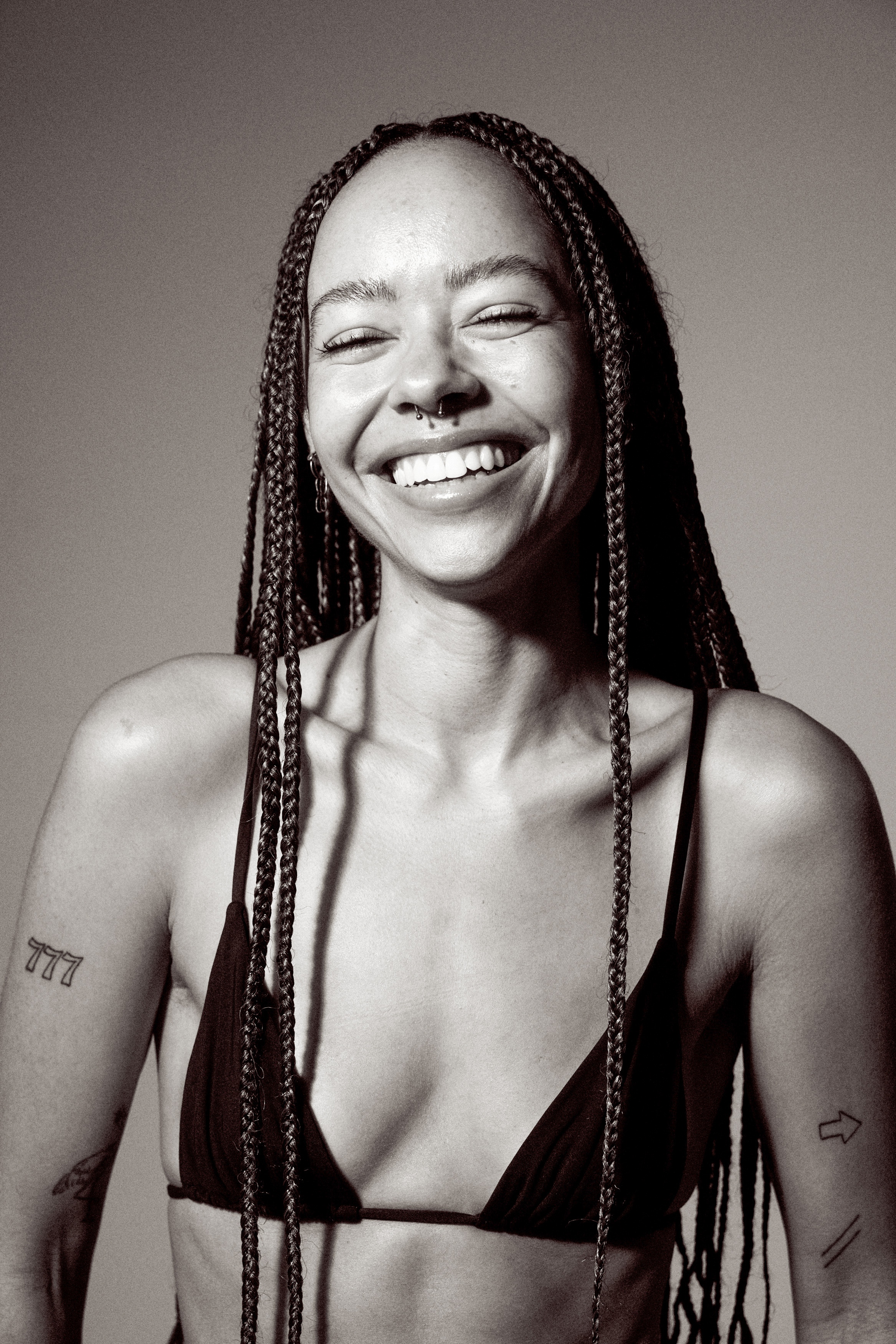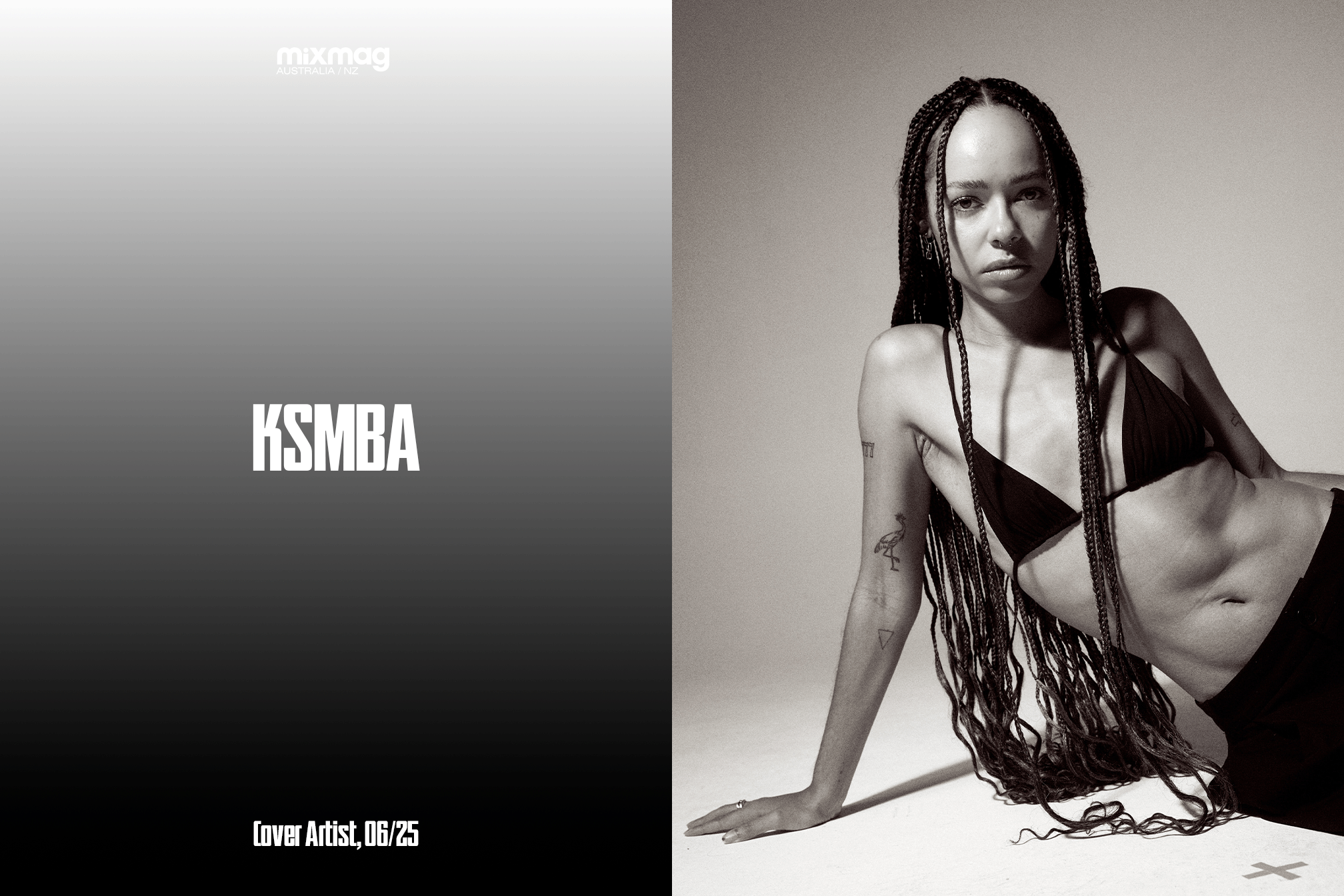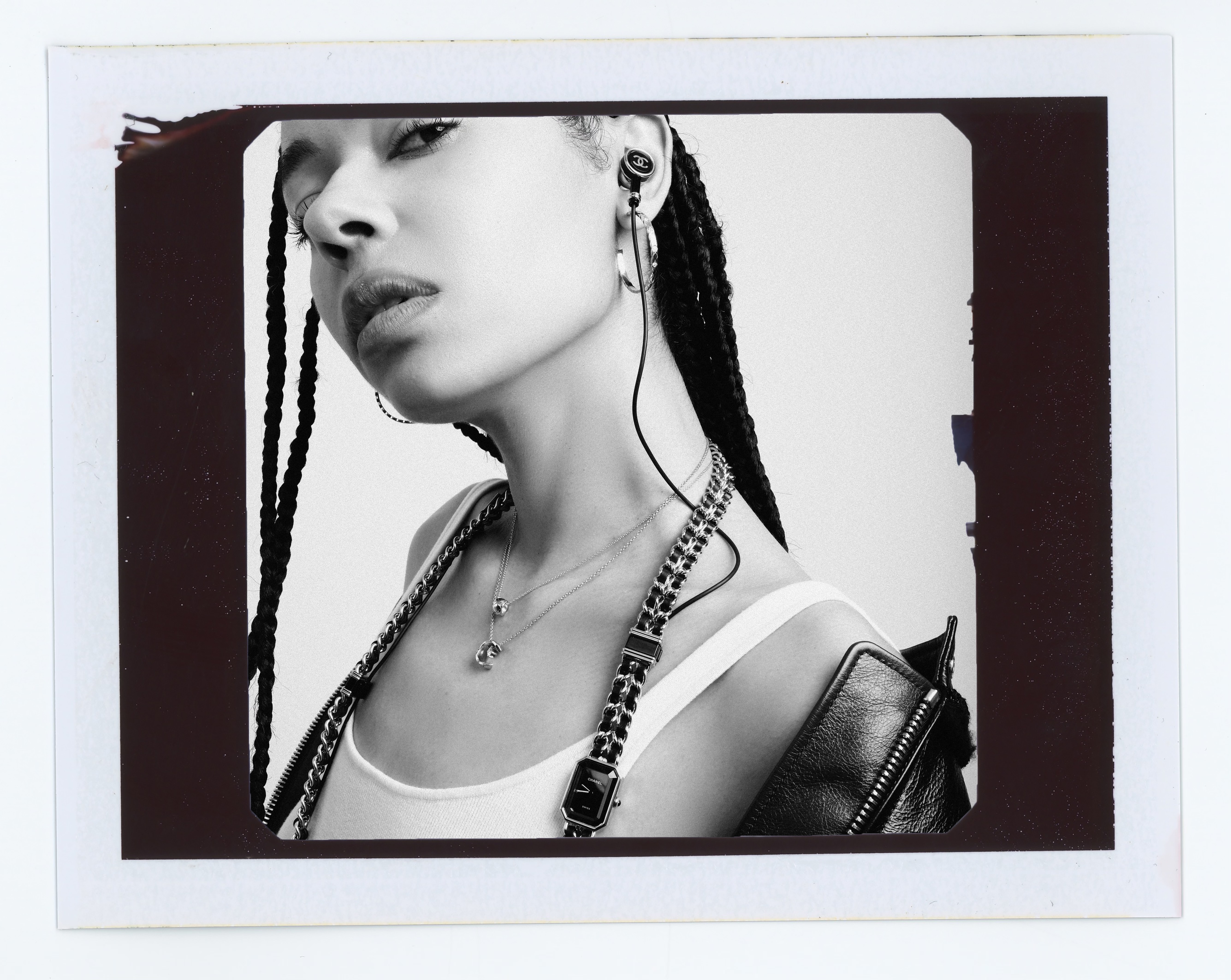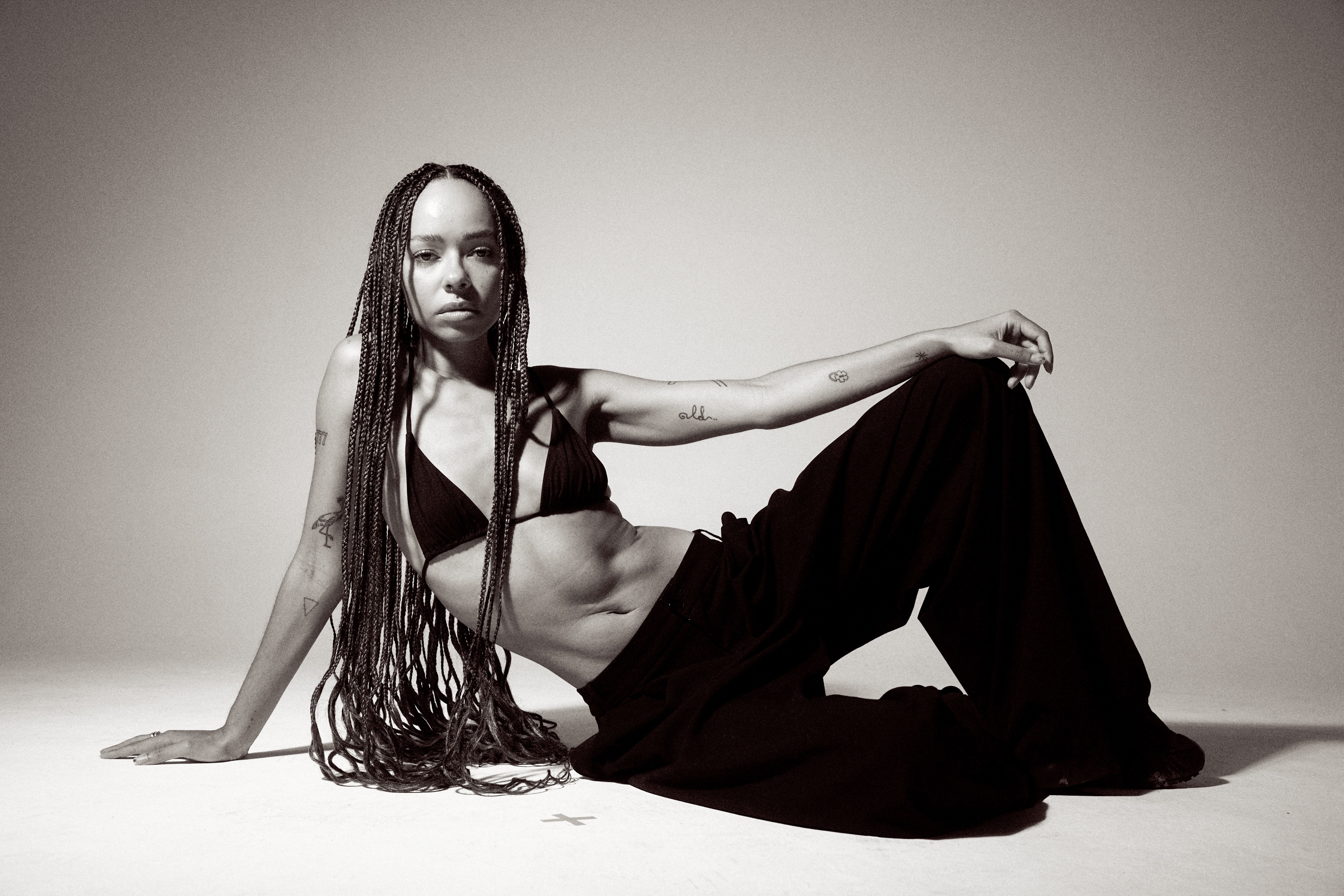 COVER STARS
COVER STARS
KSMBA: Being sensitive goes 'hard'
The rising star in Naarm/Melbourne's techno scene is Mixmag ANZ's Cover Artist for June 2025.
In 2025, you'd be forgiven for thinking everyone's a DJ.
You can buy gear anywhere, social media works as a legitimiser of whatever ‘big things’ someone might think they have coming, and a wealth of online tutorials has made it easier than ever for people to produce and release music of their own.
And yet some people actually have a claim to pioneering the space more than others, particularly in a country as white-washed as Australia.
KSMBA (they/them) is a Naarm/Melbourne-based producer, singer, songwriter, saxophone player, and so much more. They are Mixmag ANZ’s Cover Artist for June, 2025.
KSMBA, whose move into electronic music began only around two years ago, is deep in the throes of a major moment in their career. Over the last few months they’ve been steadily releasing a string of singles getting major play and playlisting across all manner of mainstream media and streaming outlets. One of their latest tracks ‘Eyes’, released via Gadigal Land/Sydney & Naarm-based label Gallery Recs and part of their upcoming EP releasing next Thursday, even saw a play on the ABC’s 24-hour news channel.
These emotive, polished and simultaneously raw singles are the latest addition to a career which, although short, has already been incredibly fruitful. Performances at Pitch Music & Arts Festival, Beyond The Valley, for Intercell, Melbourne Fashion Festival, Cartier, Let Them Eat Cake, and countless clubs around the country have been a regularity almost the entire time they’ve operated within the scene.
So too, their ‘look’ - the way they hold themselves and the confidence with which they perform - has caught the eye of high-fashion brands eager to align themselves with an exciting, blossoming face in Australia’s growing music scene.
‘Experience’ is a word that may not seem appropriate when discussing a ‘new’ talent in a music space, but it regularly oozes through so much of what KSMBA does. It’s not an experience of DJing - in fact, as they discussed in our interview, they’re far from it. Instead, it’s an experience of themselves. Perspective, respect, emotional intelligence and empathy are a part of who KSMBA is, and continue to be a part of how they explore themselves throughout their work.
At Pitch Music & Arts 2024, KSMBA, myself and a number of friends sat in one of the chill stages, making full use of the provided riders. At this stage, it looked like the festival could be cancelled that night - which meant the riders had a time limit too. Still incredibly new to the world of DJing, we spoke about all the things that they had come to learn about the way the industry operates, and how it seeks to both benefit from and squander the voices of black, queer and gender-diverse artists.
It’s within this conversation that I, the writer, recently unemployed by choice and with a desire to do something meaningful, decided to enter even more deeply into the world of dance music, and to start my own publication. KSMBA would, at some point, be on its cover, I decided, and it would look to highlight much of the injustice and lack of political context that had become the norm within Australian music journalism, and particularly within more commercially successful Australian dance music scenes.
While that publication was shelved in favour of a very appealing offer by the newly launched Mixmag Australia & New Zealand, KSMBA’s experience, even at such an early stage of their career within dance music, was able to set them apart in a way that demands that you rise to meet it.

KSMBA was not always this experienced, however. As we sat in the entryway of Joyluck Studios, a stunning shared musical space run by Rromarin and Jack Arentz in Naarm’s inner north, KSMBA revealed that their love of music came from very geeky origins.
“When everyone else realised that being in the school band wasn’t cool, I committed even more,” they said proudly.
Their youth as a classical saxophone player was, for a time, their life. They received a scholarship to study at the Royal College of Music in London for a Bachelor of Classical Music in Performance. Like so many other things however, COVID changed the outlook of that life forever. A far more introverted KSMBA moved to Naarm and began to question their identity, experience the city’s queer party scene, and understand the value of dancing.
“Ironically, I’m more of a music geek now than I was then,” they told me. “If that is possible. I think the person I am now is just the more uninhibited version of who I always was.”
While ‘the band person’ trope is one that still exists to this day, for KSMBA it was that history, of a regimented, serious approach to practice and how music functions that they feel has allowed them all of the successes they’ve enjoyed thus far. “It informs a lot of how I approach music, the way that I connect with music emotionally. The thing that I struggled with in a classical context was that it’s a very perfect and exacting artform. With dance music though, I feel this unrestrained expression.”
Unrestrained isn’t only a musical commitment when it comes to KSMBA’s relationship with electronic music. Becoming intertwined with Naarm’s queer culture and its music resulted in them dealing with a great deal of introspection. “When I left classical music, I was straight, aka in the closet, pursuing something that didn’t feel quite right. I hadn’t unpacked myself. I hadn’t come out as non-binary then. So it’s interesting to me, because my relationship with dance music has become so intertwined with me becoming more myself, more who I am. It’s letting myself just ‘be’, and exist with more ease.”
Music isn’t always the sole catalyst for change within a person however. It’s the sum of all of KSMBA’s experiences that made them open to the idea of change in the first place, and to be ready to adopt an entirely new way of thinking about their own relationship with music up until that point.
“If I had left it up to chance or luck completely, I would be where I was five years ago, which was in the closet and not a DJ,” they laughed. “It's like I finally found the right language for me, so how can I resist not doing that, you know, with every spare moment in my life?”
Drive, desire and determination have been the calling cards of hustle culture. It might be easy to assume that someone so clearly wanting to do or make something of themselves is ‘on that grindset’. Dance music has, to many, become another playground for metrics, trends, insights, data and business. Social feeds are littered with tips, tricks and courses designed to lure people into the idea of ‘hacking’ gigs and nailing transitions between some old R&B song and the latest hardgroove banger.
This idea couldn’t be further from it KSMBA’s idea of luck or chance. To them, dance music exists as complimentary to their changing outlook on life and the world around them.
“There are such limitless possibilities in electronic music,” they shared. “DJing is kind of like jazz. It’s a conversation, an improvisation, a push-pull relationship with the crowd or whoever’s experiencing it. To me, that just feels so limitless and free, and that’s why it’s probably going to take me ten, maybe fifteen years to be half decent at this thing.”
It may be somewhat ironic, then, to consider KSMBA’s genre of choice, techno.
Techno has, in many ways, just become a word. It’s become interchangeable with ‘EDM’ to refer to dance music by those who aren’t familiar, and even to those within dance music it’s become a word to simply define hard, four-four music. For KSMBA, the definition of techno is flexible. Not in the sense that each time they use it it changes, but in the sense that it refers to music of different levels of harshness and emotion.
For KSMBA, with a background in musical study but in the midst of a journey of self-expression and discovery, the fluid nature of techno clearly allows them to hold onto parts they know, and let go of ones that inspire. “There’s no rules,” they told me. “No one can say to you ‘you did that wrong’, whereas when you’re playing classical music it’s very evident if you’re wrong or you’re right.”
The binary of being wrong or right and the push against it is one that inspires much of who KSMBA is.
All that time ago, the conversation we shared at Pitch was an entirely political one. “How could our scene still be giving so much to the same cohort of white men?” we asked ourselves.
KSMBA is not one to mince words. In the modern day, artists have had to learn to become everything. Some might benefit from the presence of dedicated videographers, photographers and PR teams, but for the most part, the modern artist is expected to do this all themselves, to a point. The involvement of morally dubious global brands in more ‘underground’ dance scenes has forced an entirely new skillset for artists, one arguably ignored by the optimistic masses dominating more commercially successful lineups: politics.

KSMBA is not afraid to talk politics. Within modern dance music, and even on a broader political spectrum, the idea of being a ‘diversity’ inclusion is a conversation that still gets a lot of airtime. They’re under no illusion that, often, they are the only member of a lineup who is black, queer and gender diverse. They have, like so many others, been forced into political engagement due to who they are, and how hugely it differs from who most of the scene are: white men.
But KSMBA hasn’t shied away from what being in this position means, instead, they appear to relish the opportunity it provides to mix things up. This isn’t just on an industry level, but to them, on a broader cultural level too.
“In our culture at the moment a lot of people are asking ‘what can I take from this? What can I get from this? What can this give me?’ Something I’ve tried to reframe my thinking around is actually: ‘What can I give? What can I contribute? How can I make this better off than when I entered?’ People coming into any kind of relationship with the outlook of what can i take from this; that relationship is understandably going to become strained.”
KSMBA’s Ugandan heritage very rightly aligns them deeply with dance music. An entire world away from the origins of more ‘modern’ dance music, it’s easy for some within the scene to forget that its roots sit within the struggles of black, queer and trans people. Within Australian dance music, a scene which upon a quick Google clearly defines its ‘top DJs’ as a litany of white people, those with a real cultural connection to dance music can be tough to see, though they’re not nearly as hard to find.
“More black, BIPOC and queer people in the scene need to be involved, to be platformed, given resources, uplifted, celebrated, not when it’s just Mardi Gras weekend or Black History Month,” they reflected. “I find it absurd when lineups can be all white or all male or all cis or all able-bodied when dance music comes from marginalised people. At one time I think there was a brief moment where people were making a concerted effort because public opinion meant it was good for business to make that concerted effort, but it feels like people are being held accountable less, and there’s definitely been a pull backwards.”
KSMBA’s sentiment is, within the country’s more grassroots circles, hardly a shocking position to stand on. As they enter into a new stage of their career however, one where being playlisted by streaming services, featured on the country’s national broadcaster and playing for luxury runways is becoming the norm, it’s a position clearly still not being adopted by the biggest of the country’s promoters, agencies and changemakers.
“Especially in techno, there’s a very big cohort of these men that are just men, biggin’ up men, biggin’ up men, biggin’ up more men, that are biggin’ up more men, that are biggin’ up more men, which is crazy.”
Dance music being a ‘boys club’ is not a new conversation, but it is one that grows larger with time. In 2025, where conversations around equal rights, opportunities and privilege have started and seemingly ended all within the broader dance scene, KSMBA is understandably frustrated at the willing ignorance of many of their peers. This has become even more relevant, as they see it, with the recent uplift in new, white and male producers heavily sampling without reading the room.

“These… I was gonna say white motherfuckers… these nice white men are sampling obviously black vocals with no credit to where the vocal is coming from. None at all.” They paused. “They have no understanding of what this language is even saying or what this slang means. The audacity, the entitlement is just wild. It’s going to be awkward when they realise what that shit means.
I mean, just title the track ‘I’m Stealing From Black People’ and be upfront with what you’re doing.
You just have to look at how this country was founded. There’s such a sense of ownership over shit that’s not yours and that you don’t actually have any right to. I don’t think it’s any secret that white people have always felt entitled to our bodies, the land, the property, the art, the culture of black and brown people, and that still happens. Just because you put a black DJ on your lineup once doesn’t mean you’re devoid of doing that, it’s crazy.”
With no sign of this trend stopping however, the question remains: does safety for people from marginalised backgrounds mean sacrificing commercial viability?
While a need to speak politically has been thrust upon many artists and festivals over conversations like boycotts and what being ‘big business’ means for dance music, there’s a continued thread of apathy and exhaustion that continues to ring through comment sections. “Keep politics off the dance floor,” many of them will read.
Depending on who you ask, politics informs every person’s interaction with the world around them, and while we all share the same dance floor, we all learned to dance somewhere different. For KSMBA, politics isn’t just about fighting for change, it’s recognising who we are and how we relate to one another.
“Selective activism is just another way to exploit your privilege and reinforce systemic oppression” is a sentiment shared by French producer Jaymie Silk, someone who KSMBA looks up to hugely. The idea of activism as a costume is one that they are all too familiar with, and a costume that they feel needs to be shed in order for real change to happen in the people of the scene before the scene itself.
“Art is humans trying to leave their mark, right? For me, an important part of an art practice is having time to actually understand humans and the time that you’re existing in, what’s happening around you, your neighbours, the people who don’t look like you.
When white hard groove people are just sampling an entire black track and just putting it over a 144 kick and some snares and hi-hats, they’re not aware of what they’re doing because they haven’t done step one. If you’re not looking around you before you create, you’re just creating for mass consumption, like fast food or fast fashion.”
KSMBA’s music itself is a very clear and purposeful reaction to the focus on ‘consumption’ that they see within the industry also. While the move from classical music to techno offered them a renewed sense of musical freedom, techno’s formula has allowed them another opportunity to experiment.
In July of last year, they released their debut EP, ‘Emwe’. At the time, they made it clear that ‘Emwe’ was heavily influenced by “my Ugandan heritage, which has such strong traditions around drumming and dancing, as well as from the early Detroit techno which was so rooted in Political resistance, Blackness and Queerness.” The EP is tough, big techno. The release’s title track and ‘Ekiteero’ in particular follow techno’s lead with big hats, four-four kicks and hypnotising lead lines.
‘Enyenyozi’ however, serves as a soft and uplifting alternative to this techno formula. Featuring a strong, powerfully spiritual and emotive vocal, this is techno, but verging ever so slightly into pop and gospel.
That emotion is something KSMBA held onto, and as they developed their ability to write dance music, use hardware and bring their ideas to life more easily, it’s become the crux of their artistic identity. Recent single releases ‘Eyes’, ‘Eyes (Open)’ and ‘Everything’ have sought to provide a softness and openness rarely found within Australia' s more hardcore techno scenes.

“I wholeheartedly believe that dance music is a place that can foster a lot of really beautiful things,” they tell me as we reflect on their latest singles. “The experiences you have mean that you can go back out into the world and be kinder, be softer, be more understanding, energised and empathetic. I guess I hope that this music gives people the feeling they can be a bit more vulnerable, a bit more emotional and sensitive.
When you exist in a body that is politicised and marginalised, it can feel like you have to be strong and bold, like there’s not a lot of room for softness. But I really want to lean into that, and facilitate this collective vulnerability, gentleness and safety.”
As we came to the close of our interview, it occurred to me that this conversation had simply been an extrapolated version of one had a year prior, albeit without the threat of a festival cancellation and an entire drinks rider to show for it. It occurred to me that, a year on, the energy had still been the same.
When we open any app on any given day, it’s hard not to come across people talking about global issues as being intimidating, as being a drag, as ruining fun, as ‘spoiling’ the ignorance is bliss mentality which so many have used to protect themselves from the harshness of the world, and changing their own role within it.
But KSMBA proves that it’s cool to care.
“Once the ‘trendy’ thing starts to feel like it’s cool to care, then that will become more commercially viable, and from there hopefully it’s just habit stacking. I think world domination is on the horizon for that kind of thinking.”
-
Jack Colquhoun is Mixmag ANZ's Managing Editor, find him on Instagram.


